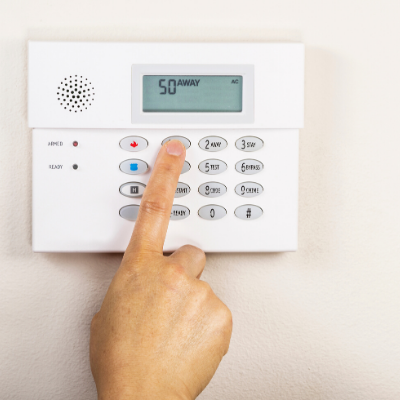Industry associations come together to highlight benefits of compliant security systems
Security systems are one of the many essential tools in the fight against crime, and in particular burglary, theft and robbery. Academic research shows professionally installed alarm systems provide a greater deterrent and properties fitted out with them are less likely to be targeted by criminals, who know they may well be monitored. Burglars want easy pickings and avoid properties with effective security.
However, when investing in a security system, either for a home or business, what should you be looking for? How do you know you are choosing the right system?
Police Crime Prevention Initiatives, have put together advice to assist with choosing a suitable system, stressing the importance of using a reputable alarm company which has been approved by an Independent Inspectorate Body.
The two main types of security systems are audible alarm systems and monitored alarm systems. They operate differently and are treated differently by the police.
Audible alarm systems sound a loud siren or bell, designed to scare a burglar and alert neighbours and passers-by at the scene to call the police to report a crime in progress and seek a police response.
In contrast monitored alarm systems are just that – monitored 24/7 by an approved commercial ‘Alarm Receiving Centre’ or ARC. When an alarm is triggered the ARC immediately checks the signal to verify it is a genuine alarm, alerts a keyholder and, if necessary, the police.
A key point to note is the police will only attend an alarm signal from a monitored alarm as long as the system complies with the National Police Chiefs’ Council (NPCC) Security Systems Policy, which details how the system is installed, monitored and maintained. It also requires security companies providing this service to be approved by an Independent Inspectorate Body and registered with the local police force.

The two Inspectorate Bodies are the NSI (National Security Inspectorate - www.nsi.org.uk) and the SSAIB (Security Systems & Alarm Inspection Board - www.ssaib.org). Both Inspectorates have search functions on their websites to assist in checking out if a security company installing alarms is genuinely approved.
Ken Meanwell, Compliance Manager, Police Crime Prevention Initiatives, advises: “Compliant security systems and reputable installation companies and ARCs are essential to ensure that you will get the appropriate response to an alarm activation. If the security system is not compliant there will not be an immediate police response, something which could be vital if someone is in immediate danger or property is being stolen.
“It is never advisable to deal with cold callers or telesales enquiries, and you should always avoid doing doorstep or telephone business. Whilst traders who call at your door can be honest and genuine, some are not and can be extremely persuasive. Examples of bad practices associated with cold-calling and door-step selling include pressure selling, waiving your rights to a cooling off period, unclear contracts, over-priced security systems and unduly raising the fear of crime.
“The BSIA (British Security Industry Association - https://www.bsia.co.uk/) have some top tips on their website around things you should know and ask an alarm provider when updating your security system.
“Having a security system, certified by one of the accredited independent Inspectorate Bodies will ensure you have a reliable and well maintained system that meets relevant British and European standards and which could result in lower insurance premiums”.
BSIA’s Director of Technical Services, Dave Wilkinson, said: “As the voice of the professional security industry, we recognise the added value our member companies bring to compliant security systems. In such challenging times, it has never been more important for consumers to rely on professional companies to deliver high quality security systems and services. Working in partnership with the National Police Chiefs’ Council and other representative industry bodies provides peace of mind and quality assurance to the public and provides a true differentiator between compliant and non-compliant security systems.”
NSI Chief Executive Richard Jenkins commented: “In responding to alarms, speed is of the essence – it can be a matter of life and death. The police recognise approved alarms and hold details on file, so that when an approved monitored alarm is triggered they are able to react and attend the scene significantly more quickly.
“Approved installers are subject to an ongoing inspection regime whereby they are required to demonstrate their technical competence and professionalism at least annually, or lose their approval. It’s far more than a one-off assessment. Anybody can check-out installers’ credentials at the Inspectorates’ websites. The key point is if the need is for automatic police response to an alarm it’s essential to deal with an approved installer who can ensure 24/7 alarm monitoring by an approved Alarm Receiving Centre.”
SSAIB chief executive Alex Carmichael commented: “It’s surprising that the benefits of third-party certification aren’t more commonly recognised – as they can reassure customers that registered firms are working to the very highest of standards.
“Through participation in standards development at national and European level, certification bodies – such as SSAIB – help to shape the nation’s security and safety standards, therefore we are able to inform others of standard issues that might impact upon service providers and end-users as well.
“Here at SSAIB, we continue to review the range of schemes we offer to ensure that they meet the needs of both the marketplace and registered firms.
“In addition, by using a third-party certificated provider, this will satisfy insurers that all reasonable precautions have been taken to mitigate risk and demonstrate that enough sufficient steps have been taken to prevent it.”
For further information, please visit https://www.policesecuritysystems.com/